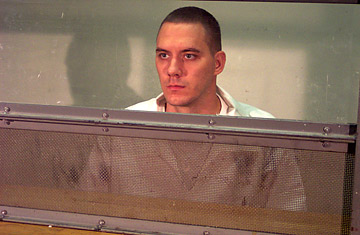
Jason Burkett during his interview in Werner Herzogs Into the Abyss
(2 of 2)
Dim bulbs both, Perry and Burkett bragged about their carjack murders that same night; soon they were arrested, Burkett sustaining five gunshot wounds from police fire. Perry, boyish and smiling in the interview that Herzog conducted a week before the execution, blamed Burkett for the heist gone wrong: Jason was the mastermind; "I was homeless and starving." Perry was found guilty and condemned to death, but in a separate trial, Delbert Burnett emerged from his jail cell into the courtroom to plead for Jason. "Please don't kill my son," he sobbed. He says that, as the jury left the courtroom, he saw two ladies cry. The vote was 10 to 2 for conviction, and Delbert believes those two women kept the young man alive; Jason was sentenced to life in prison.
The film's catalogue of catastophes, either committed or endured, may make Into the Abyss sound like an unrelenting ordeal. And no question, compared with these real-life horrors among the rural underclass, the fictional Winter's Bone was a summer camp. Like any Herzog doc, though, the movie percolates with weird humor. The director peppers his subjects with questions like (to Chaplain Gomez) "Please describe an encounter with a squirrel." Or he'll luck into a truly Herzogian camera presence. Standing in a barnyard and frequently interrupting his colloquy to turn and spit, Jared Talbert recalls when Jason Burkett stabbed him in the side with a Phillips screwdriver, "all the way to the handle," and another time Jason shot at him; the bullet missed. Talbert, who works at a paint-and-body shop, was illiterate until he learned to read while doing time on a felony conviction. Now he's got a girlfriend, Bailey, and a tattoo of her name on his forearm. What if they break up? asks Herzog. Talbert points to his arm and replies, "I guess I'm gonna hafta get Bailey sucks' right there."
Stranger still is the movie's inspirational lift. It comes courtesy of Jason's wife Melyssa, who met the convict in jail; she and her father are supervising Burkett's legal appeals. A Nebraska native, Melyssa often drove 750 miles from Omaha to Abilene to see him. Driving out of the prison after one visit, she says, she saw a rainbow and felt, "This is a sign that this is the boy I'm supposed to be with." From his cell, Jason saw it too.
A standard-issue Euro-liberal, Herzog believes that capital punishment is barbaric; but his natural curiosity for the wonders and depths of human experience encourages him and his audience to accept the meanest among us at face value. One critic, Matt Goldberg of Collider.com, has called Herzog "a tragedy vampire, sucking the drama out of the lives of others while offering nothing in return." The first part of that description could fit most documentarians, indeed most journalists, who cover sensational life-or-death matters. But even viewers with a low threshold of morbidity should get plenty in return from Into the Abyss. It provides intimate glimpses of people usually seen, and then only briefly, as faces on a post-office wall or numbers in a cemetery. Herzog asks viewers not to agree with his position on the state's right to kill, but to spend some time with folks who would kill, or be killed, for the sake of a red Camaro.
